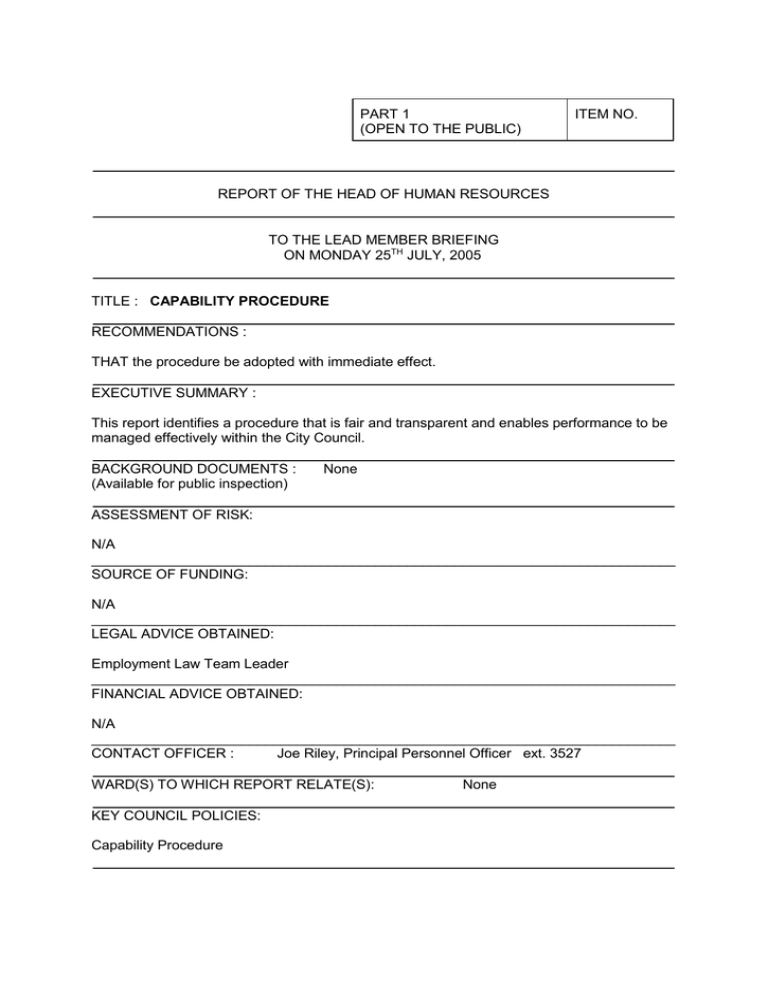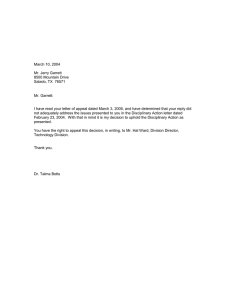PART 1 ITEM NO. (OPEN TO THE PUBLIC)
advertisement

PART 1 (OPEN TO THE PUBLIC) ITEM NO. REPORT OF THE HEAD OF HUMAN RESOURCES TO THE LEAD MEMBER BRIEFING ON MONDAY 25TH JULY, 2005 TITLE : CAPABILITY PROCEDURE RECOMMENDATIONS : THAT the procedure be adopted with immediate effect. EXECUTIVE SUMMARY : This report identifies a procedure that is fair and transparent and enables performance to be managed effectively within the City Council. BACKGROUND DOCUMENTS : (Available for public inspection) None ASSESSMENT OF RISK: N/A __________________________________________________________________________ SOURCE OF FUNDING: N/A __________________________________________________________________________ LEGAL ADVICE OBTAINED: Employment Law Team Leader __________________________________________________________________________ FINANCIAL ADVICE OBTAINED: N/A __________________________________________________________________________ CONTACT OFFICER : Joe Riley, Principal Personnel Officer ext. 3527 WARD(S) TO WHICH REPORT RELATE(S): KEY COUNCIL POLICIES: Capability Procedure None 1. BACKGROUND The City Council recognises its responsibility for encouraging good performance from all its employees and for putting into place a range of procedures and systems to achieve this e.g. Investors in People, Appraisal Schemes, Training, Consultation and Communication arrangements. The Capability Procedure is designed to complement these other arrangements and sets out the steps to be followed by Managers when an employee appears incapable of doing his/her job – or some significant element of that job – due to a personal lack of competence. A distinction clearly exists between poor performance due to competence issues (what someone cannot do even when trying his/her best) and poor performance due to wilful refusal or disinclination to work (what someone will not do). The former is a matter of competence and is to be dealt with under this procedure whilst the latter is a matter of conduct and will be dealt with under the local disciplinary procedure. Within this procedure, therefore, the emphasis is placed on trying to help the employee to achieve a satisfactory level of work performance through, for example, supervision, training and coaching, goal setting and progress monitoring. The procedure, however, also includes all the steps needed for taking action in cases where the employee’s performance does not improve, for whatever reason. (See attached procedure at Appendix 1) 2. CONSULTATION A new procedure has been developed with the full co-operation and involvement of the Trade Unions and Management Teams in each Directorate. The Trade Unions and managers recognise the need to support employees who may be incapable of undertaking their role fully to meet satisfactory performance by supporting and training staff to reach that performance and having clear actions to achieve over a set period of time. 3. NEW PROCEDURE A manager needs to decide whether there is a case to answer by gathering evidence and assess current performance against job descriptions/person specifications and decide whether an interview is required with the employee. The Capability Procedure follows the same process as the local disciplinary process where there is an informal and formal process. Once a manager has gathered evidence regarding the lack of performance then an action plan needs to be agreed to enable the employee to meet a satisfactory performance within a 3 month timescale. The action plan will cover any training that may be needed and will be monitored and supervised during this period. If an employee fails to reach an agreement on the action plan then this will be seen as wilful disinclination and this will be addressed by using the Local Disciplinary procedure. Reviewing and monitoring progress is vital and that all documentation is completed showing the progress. The possible outcomes of capability procedure are as follows. (i) Improved performance to satisfactory level and no further action required. (ii) Some improvement and a further review period required. (iii) No improvement and a need to move to the 2 staged formal process. In line with other Council policies and procedure the employee if dismissed through this procedure will have the right of appeal to the Employers Forum. CAPABILITY PROCEDURE 1. Introduction The City Council recognises its responsibility for encouraging good performance from all its employees and for putting into place a range of procedures and systems to achieve this e.g., Investors in People, Appraisal Schemes; Training; Consultation and Communication arrangements. This procedure is designed to complement these other arrangements and sets out the steps to be followed by Managers when an employee appears incapable of doing his/her job - or some significant element of that job - due to a personal lack of competence. A distinction clearly exists between poor performance due to competence issues (what someone cannot do even when trying his/her best) and poor performance due to wilful refusal or disinclination to work (what someone will not do). The former is a matter of competence and is to be dealt with under this procedure whilst the latter is a matter of conduct and will be dealt with under the local disciplinary procedure. Within this procedure, therefore, the emphasis is placed on trying to help the employee to achieve a satisfactory level of work performance through, for example, supervision, training and coaching, goal setting and progress monitoring. The procedure, however, also includes all the steps needed for taking action in cases where the employees’ performance does not improve, for whatever reason. Note: Nothing in this procedure is intended to prevent Managers from dealing with employees’ day-to-day performance problems as they arise; as such early informal discussions are vital in preventing problems from developing. Regular supervision presents an opportunity to give encouragement and support as well as discussing problems. Managers should be aware that a sudden deterioration of standards may be due to job related or personal factors which may be temporary in nature and can be overcome with discussion and support. Equally there may be some underlying health or basic skills concerns e.g. numeracy or literacy, which may require further assessment. Managers are encouraged to use the range of personnel policies; including work life balance; Occupational Health referral and carers leave where this may help the employee. 2. Identifying Performance Problems 2.1 It will be the Managers responsibility to assess whether or not a problem exists and what indications there are of an employee not measuring up to the requirements of the job e.g., complaints from colleagues, other departments, customers. 2.2 If there is need for investigation into apparent poor performance the Manager undertakes this as part of his/her normal managerial role. 2.3. The Manager shall come to a view on the matter by: Gathering all of the evidence regarding the alleged poor performance (reports, complaints, etc.) and interviewing any persons making complaints. Obtaining the employee’s job description plus any other relevant information, and establishing that any performance issues fall properly within the scope of that employee’s job. Decide if necessary to interview the employee. 3. If it is Necessary to Interview the Employee 3.1 The employee will be given 5 working days notice, a copy of this procedure, outline information about the reasons the formal interview is needed and will be advised of his/her right to bring a colleague or Trade Union representative. 3.2 As well as the Manager another member of management (or human resources officer) will be present at the interview. Full notes of the discussion will be taken. 3.3 At the meeting, the Manager will inform the employee of all causes for concern and explain that the purpose of the discussion is: For both manager and employee to be clear about the expected standard of adequate performance To establish the facts by hearing from the employee his/her interpretation of the problem/s; and To try to agree a course of action that will hopefully result in improvement of performance. The discussion will be a two-way process, highlighting problems and setting future performance expectations. 3.4 The desired outcome of the interview should be that the employee and Manager develop an action plan designed to improve performance. In the first instance, an action plan will be agreed and written down, which will involve regular monitoring of the employees performance, a review date to check the effectiveness of the action plan and to update it if appropriate. (N.B. It is recommended that an action plan be for a minimum of three months) In drawing up an action plan with the employee, the Manager will give consideration to: Training Monitoring and supervision by a skilled employee for specific tasks Permanent or temporary alterations to duties which do not change the nature of the job, but give the employee more time to focus on the “areas for improvement”. Referral to the City Council’s Occupational Health Adviser if problems such as fatigue or stress are affecting the employee’s performance. 3.5. Where the employee denies the existence of a problem and the manager is able to evidence a need to improve performance it will be reasonable for the employee to comply with the management offer of training and support. Any failure to co-operate may be treated as misconduct and dealt with under the local disciplinary procedure. 3.6 A review of the effectiveness of the action plan will be held and the possible outcomes are as follows:(i) (ii) (iii) the desired level of improvement has been achieved and no further action will be taken. Where some improvement is evidence, a further review period will be set; or no improvement is seen and the matter is moved to the formal part of the procedure 3.7 A hearing will then be convened under the Capability Procedure. The date and time of the hearing will be at least 5 days after receipt of the letter giving notice of the interview. The employee will be advised of their right to be accompanied and/or represented by a trade union official and for that person to have copies of all paperwork. The employee’s right to ask individuals to give information or evidence in support of him/her, provided their names are submitted to the officer responsible in advance, together with copies of any documentation they wish to produce or refer to. 4. 4.1 Stage One - Capability The Manager will be advised by the Head of HR or representative (this includes Corporate or Out Stationed HR Officers) and will review formally the progress to date which will include: a) The reasons for the initial discussion and action agreed or imposed. b) Progress against the action plan and full details of the areas of work performance still judged to be unsatisfactory. 4.2 The employee will be given an opportunity to present evidence of their improved performance. Where the explanation is not accepted, (or if no real explanation is offered), the manager will indicate to the employee, immediately after the meeting (and following in writing), any continuing requirements for improved performance. 4.3 A Review will be held and the manager will determine if: (i) (ii) the desired level of improvement has been achieved and no further action is necessary; or where some improvement is evidence, a further review period will be set. 4.4 Where there is no improvement in performance, the matter will be referred to Stage Two of the Capability Procedure and the employee will be called to attend a full hearing in accordance with the Local Disciplinary Procedure. 5 Stage Two - Capability The Manager will present the case before a third tier officer, along the lines set out in the Local Disciplinary Procedure. If continued unsatisfactory work performance is established the officer with delegated authority to take action may: - Extend or vary any special arrangements made under the procedure, and/or Suspend any increments normally due to the employee pending an improvement in performance to a satisfactory level. (No backdating of increments will be made for a period of poor performance) 6. Dismiss the employee, with due notice (or payment in lieu), on the basis that no improvement in performance is foreseeable, which is a fair reason in law related to capability. Appeals There shall be a right of appeal in respect of a decision under 4.8 above with regard to dismissal or the suspension of increments. The appeal will be in accordance with the Local Disciplinary Procedure. NOTE: Suspension of Increments: Increments may be suspended immediately but, in the event of an appeal being allowed, shall be reinstated in full. Dismissal: If the effective date of dismissal occurs before the appeal is held, then any loss of pay (together with continuity of service) shall be fully reinstated should the appeal be allowed. The Appeal Procedure shall be as follows: - 6.1 The employee must indicate in writing to the Head of HR his/her intention to Appeal within ten working days of being notified of the decision made at the hearing. 6.3 If no Appeal is lodged within ten working days the employee shall lose his/her right of Appeal under this procedure. 6.4 The Appeal will normally be heard by the next available Employers’ Forum following receipt of the letter giving notification of the intention to appeal. (This may be extended by mutual agreement). 6.5 The appellant will have the right to appear in person before the Employers’ Forum and may be represented by a colleague or Trade Union representative. 6.6 The officer who took the decision against which the employee is appealing and/or the Manager who undertook the initial investigation and review will also be present. 6.7 The decision of the Employers’ Forum shall be final as far as the City Council is concerned. 7. Consideration of Alternatives Nothing in this procedure shall prevent the parties discussing, at any stage, other ways of resolving the matter (such as alternative work). The terms and conditions attached to any offers of alternative work made and agreed will be subject to reasonable consideration by the Director, but will not normally involve salary protection (other than for reason of law) if the alternative job is paid at a lower rate.

